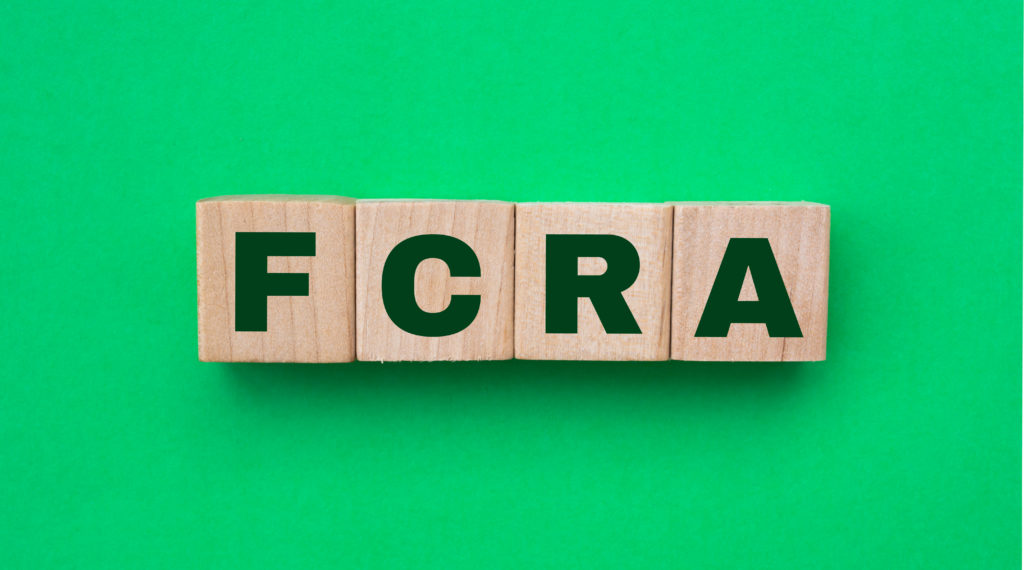Understanding the Fair Credit Reporting Act
The Fair Credit Reporting Act (FCRA) is a federal law that helps to ensure the accuracy, fairness and privacy of the information in consumer credit bureau files. The law regulates the way credit reporting agencies can collect, access, use and share the data they collect in your consumer reports.

What is the Purpose of the FCRA
FCRA was passed in 1970 and was meant to help consumers understand what actions they can take regarding the information on their credit reports. In addition to the three main credit bureaus, financial information on individuals is being gathered all the time to use to analyze a consumer.
Why does this information matter? Any time you apply for any type of loan or credit, your financial history is checked to determine your “creditworthiness”. This credit history will determine what terms you are offered as well as determine if you are approved. It is not only banks and credit card companies that use this information, however. For example, a landlord can check your credit to determine if you are likely to pay your rent on time. An auto insurance company may check your credit to determine how much they want to charge you for your premiums. In some states, even an employer can check your credit as a means of determining how responsible you may be.
How FCRA Helps Consumers
The FCRA helps protect you by regulating how information in your consumer report can be used and accessed.
- Gives you the right to be told how your credit was used against you if your application was denied when applying for credit, insurance, or employment
- Gives you the right to access your credit report at any time. You get one free credit report per year from each of the three credit bureaus
- Restricts who can access your credit report. In general, access is limited to people with a “permissible purpose,” such as landlords, creditors and insurance companies. If an employer wants to see your credit report, you must give written consent. Employers must meet other requirements as well, and not all states allow employers to pull credit reports.
- Allows you dispute information you believe to be incorrect
- Negative information must be removed after a prescribe amount of time. For example, a bankruptcy can only appear for 10 years.
- Allows you to opt out of pre-screed offers
- Allows you to place a security freeze your credit. This means anyone requesting a copy of your credit must be provided with a PIN to see your information.
For more information about each of these topics, see below or visit https://www.consumerfinance.gov/learnmore/.
Summary of Your Rights
You must be told if information in your file has been used against you
Anyone who uses a credit report or another type of consumer report to deny your application for credit, insurance, or employment – or to take another adverse action against you – must tell you, and must give you the name, address, and phone number of the agency that provided the information.
You have the right to know what is in your file
You may request and obtain all the information about you in the files of a consumer reporting agency. Proper identification will have to be provided, such as your social security number. In many cases, the disclosure will be free. You are entitled to a free file disclosure if:
- a person has taken adverse action against you because of information in your credit report;
- you are the victim of identity theft and place a fraud alert in your file;
- your file contains inaccurate information as a result of fraud;
- you are on public assistance;
- you are unemployed but expect to apply for employment within 60 days.
All consumers are entitled to one free disclosure every 12 months from each nationwide credit bureau.
You have the right to ask for a credit score
Credit scores are numerical summaries of your creditworthiness based on information from credit bureaus. You may request a credit score from consumer reporting agencies that create scores or distribute scores used in residential real property loans, but you will have to pay for it. In some mortgage transactions, you will receive credit score information for free from the mortgage lender.
You have the right to dispute incomplete or inaccurate information
If you identify information in your file that is incomplete or inaccurate, and report it to the consumer reporting agency, the agency must investigate unless your dispute is frivolous.
Consumer reporting agencies must correct or delete inaccurate, incomplete, or unverifiable information
Inaccurate, incomplete or unverifiable information must be removed or corrected, usually within 30 days. However, a consumer reporting agency may continue to report information it has verified as accurate.
Consumer reporting agencies may not report outdated negative information
In most cases, a consumer reporting agency may not report negative information that is more than seven years old. Bankruptcies are reported no more than 10 years old.
Access to your file is limited
A consumer reporting agency may provide information about you only to people with a valid need — usually to consider an application with a creditor, insurer, employer, landlord, or other business. The FCRA specifies those with a valid need for access.
You must give your consent for reports to be provided to employers
A consumer reporting agency may not give out information about you to your employer, or a potential employer, without your written consent given to the employer. Written consent generally is not required in the trucking industry.
You may limit “prescreened” offers of credit and insurance you get based on information in your credit report
Unsolicited “prescreened” offers for credit and insurance must include a toll-free phone number you can call if you choose to remove your name and address from the lists these offers are based on. You may opt-out with the nationwide credit bureaus at 1 888 5OPTOUT (1 888 567 8688).
You may seek damages from violators
If a consumer reporting agency, or, in some cases, a user of consumer reports or a furnisher of information to a consumer reporting agency violates the FCRA, you may be able to sue in state or federal court.
Consumers Have The Right To Obtain A Security Freeze
You have a right to place a ‘security freeze’ on your credit report, which will prohibit a consumer reporting agency from releasing information in your credit report without your express authorization. The security freeze is designed to prevent credit, loans, and services from being approved in your name without your consent. However, you should be aware that using a security freeze to take control over who gets access to the personal and financial information in your credit report may delay, interfere with, or prohibit the timely approval of any subsequent request or application you make regarding a new loan, credit, mortgage, or any other account involving the extension of credit.
As an alternative to a security freeze, you have the right to place an initial or extended fraud alert on your credit file at no cost. An initial fraud alert is a 1-year alert that is placed on a consumer’s credit file. Upon seeing a fraud alert display on a consumer’s credit file, a business is required to take steps to verify the consumer’s identity before extending new credit. If you are a victim of identity theft, you are entitled to an extended fraud alert, which is a fraud alert lasting 7 years.
A security freeze does not apply to a person or entity, or its affiliates, or collection agencies acting on behalf of the person or entity, with which you have an existing account that requests information in your credit report for the purposes of reviewing or collecting the account. Reviewing the account includes activities related to account maintenance, monitoring, credit line increases, and account upgrades and enhancements.

.gif)


